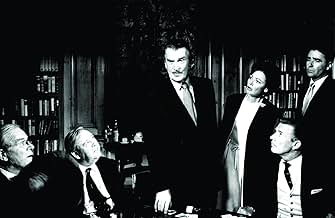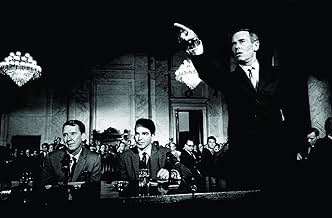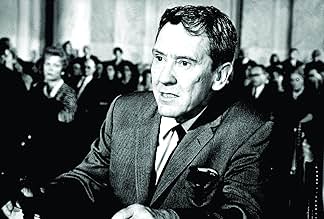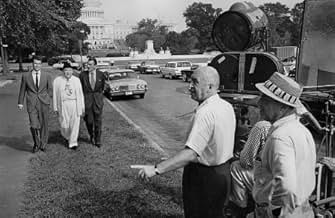Une nomination présidentielle controversée menace la carrière de plusieurs politiciens de premier plan.Une nomination présidentielle controversée menace la carrière de plusieurs politiciens de premier plan.Une nomination présidentielle controversée menace la carrière de plusieurs politiciens de premier plan.
- Réalisation
- Scénario
- Casting principal
- Nomination aux 1 BAFTA Award
- 1 victoire et 2 nominations au total
Avis à la une
It really has aged very well, and is, obviously, at least as relevant today as it was in 1962 --"realistic" in its depiction of the congressional situation in its own day, positively prescient in its relation to our own.
Fonda is good, but curiously second fiddle to the other, more subtle characters.
It's Walter Pigeon's best flick (by far), well cast as the Senate Majority Leader and he carries the role off with an almost Shakespearean aplomb.
Almost Charles Laughton's best (only because that's a very hard call), with his hopelessly crumpled white suit and hat, shufflin' gait, positively Irvinesque homespun witticisms and wonderful, drawling, contemptuous "Mis-ter Rob-ert A. Leff-in-well".
Might be Franchot Tone's best, as well, as the ailing, frail, chain-smoking president, a little bit too close to Life (filmed 6 years before he died of lung cancer).
Gene Tierney is very good as the D.C. socialite hostess "Dolly Harrison" --a character clearly based on Averill Harriman's wife Pamela or, as a type, a later Katherine Graham.
Definitely Peter Lawford's best film --which, admittedly, is not saying much, but he's very well cast as a rather dissolute, philandering Kennedyesque senator who is, nonetheless, not without his Qualities.
Lew Ayres' Casper Milquetoast "Vice President Harley M. Hudson" is an excellently wrought character, from his "bucket of warm spit" role as the impotent President of the Senate to the wonderful twist he gives it at the end, which expounds quite beautifully the subtleties and definitiveness of the Reality of Power.
The scenes of D.C. are positively nostalgic --imagine anyone being able to catch a cab to the capital and then walk right up the steps and go inside ; or an aged night-watchman making his rounds as *the* Security for the inside of the Senate building.
As are the various aspects of the underground "Gay Scene" in NYC with the wonderfully cast Larry Tucker, Jerry Fielding's fine music and "the voice of Frank Sinatra" (as credited). (Some might object to the "clichés" in these scenes, but, to me, those clichés are part and parcel of the ambiance of the period of the film and the culture it portrays and should be seen as such --rather like appreciating the overt racism in "Birth of a Nation" for what it is. I am glad that Preminger didn't "sanitize" his presentation of this matter, especially given the crucial nature of it to the plot of the film.)
But the contrast between the civility --albeit occasionally a rather raw one-- of the senate of circa 1960 and that of the present day is not nostalgic quite so much as it is just heart-rending ("The World We Have Lost"), and the roots of our present grotesque, take-no-prisoners congressional savagery are fully exposed in the intertwined plot lines of McCarthyesque ideological rigidity and homosexual blackmail.
All in all, a "Roman à Clef" to the political world of 1960's Washington, vividly relevant to our own time.
Advise & Consent is a real ensemble piece. There are times when we will follow one character for a few minutes to see the part they would play in this vote, but it never locks in on one person long enough to have a true protagonist. This added to the element of surprise, making it even harder to predict which way the story might go. There were a number of powerful scenes that I loved, and those made up for some of the slower scenes where it felt like we were getting stuck in the tedium of Senate procedures. I did find that the end of the film was a bit too convenient, which made it seem contrived. It's certainly the appropriate Hollywood ending, but in real life it is rare that things would time out as perfectly as we see here. That being said, the story of Advise & Consent is still a good one, and this film feels entertaining and maybe just a little educational at the same time.
The movie version (more so than the novel) is as much or more about the practicalities of politics than it is about ideology. Some of the political issues themselves were hotly debated topics in the movie's own era, and a couple of them are still topical now, but even they are often secondary to the harsh and often unseemly realities of political power. All of the major characters have their flaws and make mistakes, yet all but a couple of them have some worthwhile characteristics. On its best level, the story is not about winning and losing so much as it is about the ways that political battles affect individual lives and personal character.
There are numerous good performances and some fine casting. Charles Laughton personifies the old-time Senator Cooley, Walter Pigeon (the spell-checker refuses to accept it spelled properly) could not have been better chosen as the Majority Leader, and Henry Fonda is perfect in a challenging role that calls for him to maintain a difficult balance. Even most of the supporting roles are filled well by fine actors like Lew Ayres, Franchot Tone, and Burgess Meredith (who uses his brief screen time very effectively, in a role that must have been quite ironic for him personally).
Naturally, some of the characters and events from the novel had to be omitted or streamlined, but there is still plenty of meat left, even once you discount the Cold War era ideological issues. The personal lives and personal agendas of the characters, the tension between their lives as individuals and their responsibilities as public servants, and the contrast between what they do and what the public sees, all give the movie some extra depth that makes it worthwhile and that gives it meaning that goes well beyond the political issues on the surface.
It was the first film in seven years for Gene Tierney and the last for Charles Laughton. Tierney couldn't have chosen a better comeback and Laughton a more fitting farewell.
It's up to the majority leader, Bob Munson (Walter Pidgeon) to get the President's (Franchot Tone) nominee for Secretary of State (Henry Fonda) confirmed, but it's not going to be easy.
Senator Cooley from South Carolina (Laughton) believes that Robert Leffingwell once had Communist ties and doesn't want him confirmed, even if it means digging up marginal people (Burgess Meredith) who claim to have known Comrade Leffingwell.
An ambitious, aggressive young senator (George Grizzard) loudly wants Leffingwell approved, and he will do anything to make it happen - even if it means blackmailing the chairman of the hearing, Brig Anderson (Don Murray).
There is pressure on the President to withdraw Leffingwell, and he refuses; the President puts pressure on Anderson to get him confirmed, and, sticking to his own principles, Brig, despite a tremendous threat to his home and political position, refuses to reconvene the hearing.
Meanwhile, if Leffingwell stays in and there's a tie, it will be up to the Vice President (Lew Ayres) as the President of the Senate, to break it.
This is a brilliantly done film that has you glued from the first moment to the last. It not only gives a vivid portrait of politics and how the Senate works but keeps the viewer in suspense for the entire movie.
The acting is magnificent. Franchot Tone gives a sturdy performance as a President running out of time; Lew Ayres underplays and makes sympathetic the role of the compromise Vice President; Walter Pidgeon is elegant and authoritative as the majority leader; Henry Fonda gives a straightforward, honest portrayal of a man who wants to serve his country but has to go against some of his own beliefs in order to do it.
There isn't a wrong note throughout, even down to a very young and pretty Betty White who has a tiny role as a Senator and Peter Lawford as a Jack Kennedy type.
Inga Swenson is the insecure Mrs. Anderson and gives a heartbreaking performance as a loving wife who feels she has failed her husband in some fundamental way.
Laughton is great, but he is given some very florid dialogue, and he rises to the occasion by hamming it up. It was an appropriate choice given the script.
Gene Tierney, as a wealthy widow/hostess who sees Pidgeon on the side, looks beautiful and gives a charming performance.
The end of this movie is incredibly powerful, and the scene with the President, Vice President and Senate Majority leader Munson is one of my favorites for a special reason.
In the book, the Vice President, who is terribly worried about the President's health, has an encounter with the President and then goes back to his office and expresses some emotion about the meeting.
Though the scene isn't in the film, Lew Ayres obviously read the book and has the same emotional reaction, but unspoken, on the Destroyer. Unless you've read the book, you won't pick it up, but it's an even greater scene if you have.
IMDb members have posted that nothing has changed today. In politics, I'm sure that is true. In films, unfortunately, things have changed.
A character-driven film rich in dialogue like "Advise and Consent" is hard to come by. See it and revel in the film-making past and shake your head at the timeliness of the story.
Le saviez-vous
- AnecdotesDirector Otto Preminger offered the role of a Southern senator to Martin Luther King Jr., believing that the casting could have a positive impact (despite the fact that there were no black senators at the time). King declined after serious consideration, as he felt playing the role could cause hostility and hurt the civil rights movement.
- GaffesWhen the roll call vote is being conducted on the motion to advise and consent to Leffingwell's nomination, Senator Van Ackerman's name is not called. Even though he had left the Senate Chamber, the clerk would still have called his name.
- Citations
Johnny Leffingwell: The phone - Senator Munson.
Robert Leffingwell: Tell him I've gone out.
Johnny Leffingwell: Why?
Robert Leffingwell: Because, Johnny, he'll want to do some things that might obligate me.
Johnny Leffingwell: I mean why do you want me to lie? If you're in, you're in; if you're out, you're out.
Robert Leffingwell: Son, this is a Washington, D.C. kind of lie. It's when the other person knows you're lying, and also knows you *know* he knows. You follow?
- Versions alternativesAlso available in a computer colorized version.
- ConnexionsFeatured in Henry Fonda: The Man and His Movies (1982)
- Bandes originalesThe Song from Advise and Consent
Music by Jerry Fielding
Lyrics by Ned Washington
Sung Frank Sinatra - voice on juke box
Meilleurs choix
Détails
- Date de sortie
- Pays d’origine
- Site officiel
- Langue
- Aussi connu sous le nom de
- Advise & Consent
- Lieux de tournage
- Columbia/Sunset Gower Studios - 1438 N. Gower Street, Hollywood, Los Angeles, Californie, États-Unis(Studio, Senate Chamber - interiors)
- Sociétés de production
- Voir plus de crédits d'entreprise sur IMDbPro
- Durée2 heures 19 minutes
- Couleur
- Rapport de forme
- 2.35 : 1






































